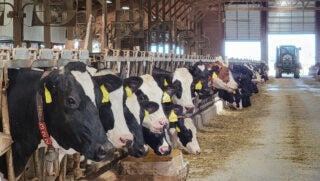There’s a glimmer of hope, albeit a small one, for the U.S. House version of the 2018 Farm Bill, following House lawmakers’ rejection of the Agriculture and Nutrition Act of 2018 (H.R. 2) last week. That small flicker could quickly fade, however, if votes on several competing immigration proposals aren’t held before June 22.
Michigan Farm Bureau National Legislative Counsel, John Kran, is hopeful it will allow House leaders enough time to resolve differences and vote on another Farm Bureau priority — immigration reform. “Several members in Congress who voted against the 2018 farm bill were hoping to force a vote on immigration legislation, including Rep. Bob Goodlatte’s (R-Va.), AG Act, which would create a new, “H-2C” visa for both year-round and seasonal agriculture jobs,” he said.
The bill, introduced last October, would permit 450,000 H-2C visas a year with allowances to adjust that number depending on agricultural labor needs. Although there are far more than 450,000 seasonal and year-round agricultural jobs in the U.S., this push is the first time in over five years Congress is having a serious debate on helping farmers find labor.
“Under the rules announced this week, the House has established June 22, as the deadline for reconsidering the 2018 Farm Bill,” Kran explained. “It’s our understanding that no amendments will be allowed, and that the vote will on the same 2018 farm bill package that was rejected last week.”
While calling immigration a worthy issue, American Farm Bureau Federation President Zippy Duvall warned lawmakers they are playing a dangerous game by using the farm bill as their bargaining chip in the midst of the worst farm economy since the Great Depression.
“They (farmers) are facing very real financial challenges,” Duvall said. “The risk management tools of the farm bill are far too important, particularly at a time of depressed farm prices. Our nation’s farmers are not pawns in a political game. They are the lifeblood of our nation.”
Duvall warned the dire consequences of a failing farm economy will impact more than production agriculture and that rural communities cannot thrive without agriculture and the many jobs it supports, from food processing and packaging to transportation.
“Many farmers, at this very moment, are wondering whether to stay in agriculture or put the animals, land and equipment up for sale, they’re going to make that decision based on whether the future looks stable or unclear,” Duvall said. “With some in Congress holding the farm bill—and by extension farmers themselves — hostage to a separate issue, the future is far from certain for many of our nation’s farmers.”
Duvall stressed that American political history is filled with examples of politicians who seemed to forget who put them in office, turned their backs on agriculture and rural America, and paid the price at the ballot box.
Citing a 2016 political race, Duvall said an incumbent member of Congress from Kansas lost his seat in the primary when farmers turned out in droves to let him know that voting against the 2014 farm bill was a critical mistake.
“I think sometimes our politicians forget that the “issues” they debate mean much more to the people affected by them,” Duvall pointed out. “For us, the farm bill isn’t just an issue, it’s about our livelihood, our life’s calling, and the source of our nation’s food security. Be assured that rural Americans will remind them of that every chance we get—including election-day.”
As Congressional members head home for the Memorial Holiday recess, Michigan Farm Bureau President, Carl Bednarski, a Tuscola County farmer suggested that farmers have a rare but very timely opportunity. “If your U.S. Representative supported the farm bill, let them know you appreciate and trust they will continue to support passage of a 2018 farm bill,” he advised.
“More importantly, if they didn’t support passage, let them know what’s at stake for your farm, as well as rural Michigan’s economy. In fact, you might also consider reminding them that there’s an election this fall, and that the rural vote can and does make a big difference in the outcome,” he concluded.


